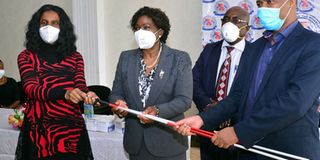Premium
I was blindly accused of stealing a baby

National Fund for the Disabled of Kenya (NFDK) board member who is also the CEO of Kenya Law Reform Commission Josephine Sinyo (left) with other NFDK officials at a past event. She has vowed not to stop talking about issues that affect women with disabilities.
What you need to know:
- Ms Josephine Sinyo, Chief Executive Officer of KLRC was once labelled a thief for breastfeeding someone's child, yet she can't see.
- From then on, she vowed “to be proud as a blind woman and I will not stop talking about the issues that affect women with disabilities.
When Ms Josephine Sinyo, Chief Executive Officer of Kenya Law Reform Commission (KLRC) delivered her first born, the health officers at the hospital did not record that she was blind, as such in need of special care.
Instead, they put her child together with the rest of the children in the new-born unit. She could only tell who her child was by the bed she had placed her.
On one occasion, her child was moved. She ended up picking the wrong one, whom she breastfed.
Hell on her! She was accused of stealing the baby.
“It was a nasty experience! I was labelled a thief. The woman (exclaimed) ‘How could you breastfeed my child with your contaminated milk?’” she said while sharing her experience during a recent virtual meeting Inter-Generational Retreat on Leadership in Africa 2020 by African Women Leaders Network (AWLN).
Create awareness
This experience pushed her into firmly advocating for the rights of women with disabilities.
From then on, she vowed “to be proud as a blind woman and I will not stop talking about the issues that affect women with disabilities.”
It is, therefore, important to create awareness on how women with disabilities are affected differently in the society, she said.
“Make the people understand what it means not to see by blindfolding them and letting them walk,” she said.
“Take them to a rough terrain and let them walk to have an experience on how hard it is for a person with disability,” she said adding that people expect them to behave normally yet they are faced with major difficulties.
Wanja Maina, a disability rights advocate said young women with disabilities are often forgotten in policy development and empowerment interventions.
Stigmatisation
“We need to get our policies right and open up political spaces for young women with disabilities,” she said.
She was concerned by the decline in representation of women with disabilities in political leadership, noting that this could lead to silencing of their voices in development issues.
“Right now there are only 42 women with disabilities in the county assemblies and in 2013, they were 64. If that is the trend, then in 2022, we will probably be 30,” she said.
She identified stigmatisation, lack of identity cards and information on empowerment and government programs, as major impediments to growth and development of persons with disabilities.
“There is need for change of attitude towards people with disabilities. Treat them as equals.”





